
 i_need_contribute
i_need_contribute

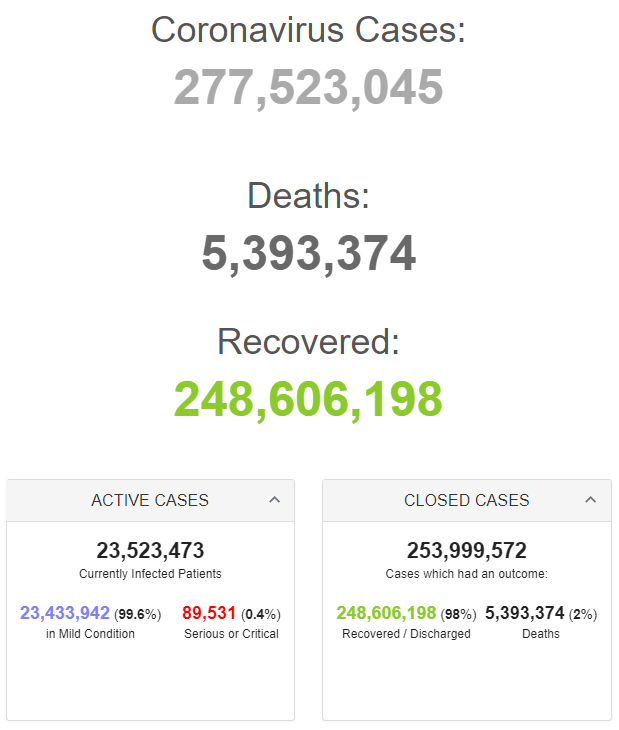

Retrieved from: https://www.worldometers.info/coronavirus/
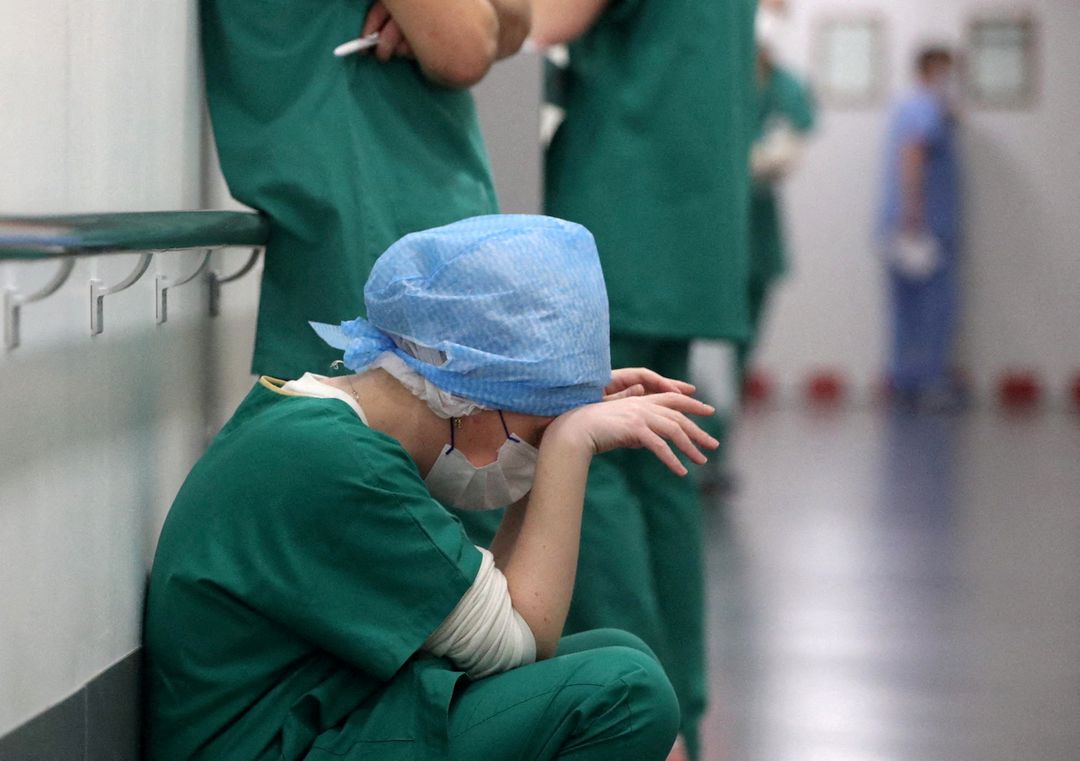
Doctor Ruxandra Divan, rests in the Intensive Care Unit (ICU) for COVID-19 patients at "Hopitaux Civils de Colmar" in Colmar, France, December 15, 2021. REUTERS/Yves Herman/File Photo
South African data offered a glimmer of hope on Wednesday about the severity of the Omicron coronavirus variant, but World Health Organization officials cautioned that it was too soon to draw firm conclusions as the strain spread across the globe.
With the second Christmas of the pandemic days away, countries imposed new restrictions on their citizens while worrying about the damage the variant might inflict on their economies.
Plans for Christmas parties and celebrations were wiped out from London to New Delhi amid the uncertainty.
Omicron was first detected last month in southern Africa and Hong Kong. Preliminary data indicated it was more resistant to vaccines developed before it emerged.
But a studyby South Africa's National Institute for Communicable Diseases (NICD) suggested that those infected with Omicron were much less likely to end up in hospital than those with the Delta strain.
COVID-19 cases also appear to have peaked in South Africa's Gauteng province, where Omicron first emerged, it said.
The study, which has not been peer-reviewed, compared South African Omicron data from October and November with data about Delta between April and November.
"In South Africa, this is the epidemiology: Omicron is behaving in a way that is less severe," the NICD's Professor Cheryl Cohen said.
"Compellingly, together our data really suggest a positive story of a reduced severity of Omicron compared to other variants."
It noted though that as the majority of people in South Africa have had a prior COVID-19 infection, they could have a higher level of immunity.
The positive news was bolstered by research from London's Imperial College which said the risk of needing to stay in hospital for patients with Omicron was 40% to 45% lower than for patients with Delta.
However, the WHO technical lead on COVID-19, Maria van Kerkhove, said the U.N. agency did not have enough data to draw firm conclusions.
The data was still "messy," she told a briefing in Geneva.
"We have not seen this variant circulate long enough in populations around the world, certainly in vulnerable populations. We have been asking countries to be cautious, and to really think, especially as these holidays are coming up."
The WHO's European head, Hans Kluge, told Reuters in Brussels that three to four weeks was needed to determine Omicron's severity. He said Omicron was likely to be the main coronavirus strain in Europe in a few weeks.
Britain on Wednesday reported more than 100,000 new daily COVID-19 cases for the first time since widespread testing was introduced, leaving many industries struggling with staff shortages as workers self-isolate.
France reported 84,272 new COVID-19 infections in the last 24 hours, close to its all-time high.
"There is no doubt that Europe is once again the epicentre of the global pandemic. Yes, I'm very concerned, but there is no reason for panic. The good news is... we know what to do," Kluge said.
VACCINATE
Germany, Scotland, Ireland, the Netherlands and South Korea have reimposed partial or full lockdowns or other social distancing measures in recent days. read more
Germany's health minister said he had not ruled out a full lockdown. read more
Italy was preparing new measures and might make vaccinations obligatory for more categories of workers, Prime Minister Mario Draghi said.
Spain made it compulsory to wear a face mask outdoors again as part of a package aimed at containing Omicron. But Prime Minister Pedro Sanchez reassured citizens: "Don't worry, families will be able to celebrate Christmas."
In the United States, U.S. Centers for Disease Control and Prevention (CDC) Director Rochelle Walensky said the seven-day average of COVID-19 cases increased by 25% from the previous week to about 149,300 cases per day.
On Tuesday, President Joe Biden warned the quarter of American adults who are unvaccinated that their choices could spell the "difference between life and death".
In Asia, New Delhi banned Christmas and other celebrations ahead of the New Year.
The Chinese city of Xian - home to the Terracotta Warriors - told its 13 million residents to stay at home as it struggled to contain rising COVID-19 cases.
Policymakers across the world are trying to address the economic blow that might come from new outbreaks.
But Wall Street saw a broad rally on Wednesday after the hopeful news on Omicron's severity and upbeat consumer confidence and other economic data. read more
More than 275 million people have been reported to be infected with the coronavirus around the world, and nearly 5.7 million have died, according to a Reuters tally.
Infections have been reported in more than 210 countries and territories since the first cases were identified in central China in December 2019.
Interactive graphic tracking global spread of coronavirus: open https://tmsnrt.rs/2FThSv7 in an external browser.
Eikon users can click https://apac1.apps.cp.thomsonreuters.com/cms/?navid=1063154666 for a case tracker.
Retrieved from: https://www.reuters.com/world/the-great-reboot/omicrons-march-revives-urgent-global-calls-vaccinations-2021-12-22/
By Carl O'donnell and Ahmed Aboulenein
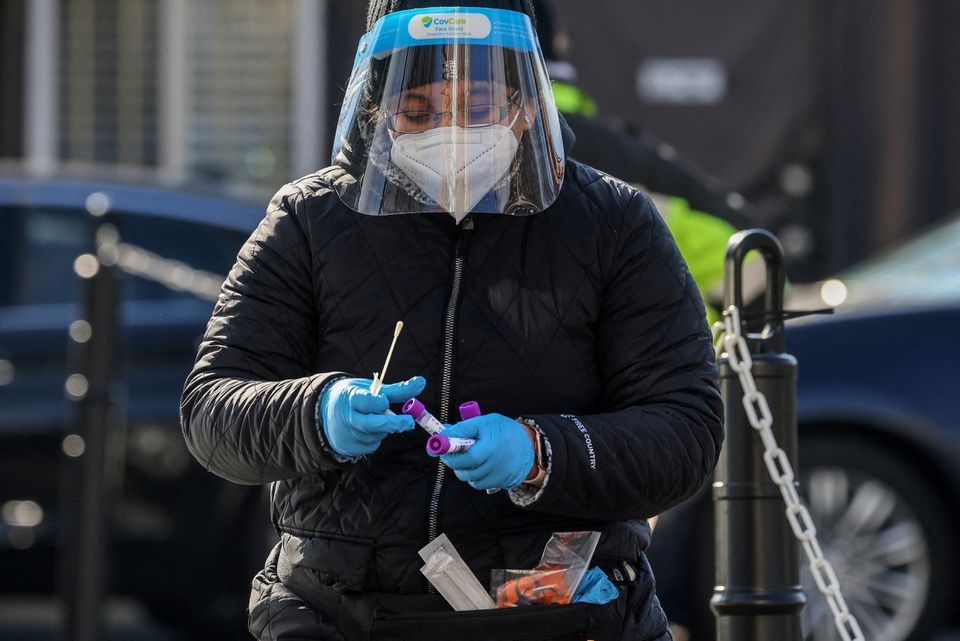
EMT Veronica Melgar performs COVID-19 tests at a Sameday Health drive-through testing site in Bethesda, Maryland, U.S., December 22, 2021. REUTERS/Evelyn Hockstein
A surge in U.S. COVID-19 cases from the Omicron variant is overwhelming testing capacity in high-infection areas like New York City due in part to staffing shortages among healthcare workers and the limited number of open test sites, according to interviews with more than a dozen officials, health providers, and testmakers.
Some testing centers, such as the New York area's CityMD, have had to shut sites due to a lack of workers, causing long lines in others, they say. The demand is exacerbated by a months-long shortage of at-home rapid tests in pharmacies that has worsened in hardest-hit regions.
The highly contagious Omicron variant has become the dominant coronavirus strain in the United States in the past 10 days. U.S. infections have doubled since early November to a seven-day average of more than 150,000 cases per day, according to a Reuters tally. One national lab company said testing has increased more than 30% in the past week. States where infections are climbing such as Ohio and Texas also said they were struggling to keep up with demand.
"The issue... in our community is with access," said Dr. John D'Angelo, who heads emergency medicine at Northwell Health, a health system in New York. "The demand for rapid testing is driving long lines at our testing sites."
A spokesperson for XpresCheck, which provides COVID-19 tests at 11 U.S. airports, said recent staffing shortages have worsened the impact of rising infections, resulting in longer wait times for airport testing.
The United States has a shortage of workers across industries with about 11 million available jobs going unfilled, according to the Bureau of Labor Statistics.
In healthcare and social work, about 8.3% of jobs are vacant based on October federal data, about 1.5 percentage points above the overall rate.
"Our big one-two punch is an Omicron surge... with unprecedented depletion of our health care workers," said Dr. Peter Hotez, dean of the National School of Tropical Medicine at Baylor College of Medicine.
Demand for tests will likely increase until January based on current models of the virus's spread, said Mark Stevenson, chief operations officer at Thermo Fisher Scientific (TMO.N), a testmaker.
The White House has invested $3 billion since September with the aim of quadrupling U.S. production of rapid at-home tests to 200 million per month by December.
Several testmakers told Reuters they have more than doubled capacity in recent months putting tens of millions more tests on the market each month.
That would still fall far short of the number of rapid at-home tests that health experts say are needed for the country's 330 million residents.
The White House on Tuesday said it will open testing centers across the country, starting with one in New York City before Christmas. It also plans to provide 500 million rapid at-home tests for free directly to consumers starting January.
"By the time these tests are rolled out, we will very likely be right in the middle of the peak, if not past it," said Sam Scarpino, managing director of pathogen surveillance at the Rockefeller Foundation's Pandemic Prevention Institute.
Thermo Fisher said it is boosting its supply from around 5 million COVID-19 tests per week in October to as much as 20 million by the end of the year. Quidel Corp (QDEL.O) says it has increased its test production to a run-rate of around 70 million per month, up from around 20 million earlier this year.
Testmaker InBios International, one of 11 FDA-approved at home tests, expects to supply up to 5 million tests monthly starting in January. Experts caution that the White House's purchases of 500 million rapid tests could divert supplies from retailers and some healthcare providers.
A report by the Kaiser Health Foundation assessing the availability of four rapid home COVID-19 tests at six major U.S. online retailers found that tests were unavailable 73% of the time in November, compared to 95% in September.
"Test manufacturers can only make a finite number of tests," said Lindsey Dawson, an associate director of healthcare policy at the Kaiser Family Foundation.
"Whether what's leftover...is enough for consumers looking to pick up tests at their drugstore (or) community health center, is something that we'll have to watch."
Retrieved from: https://www.reuters.com/world/us/us-testing-struggles-keep-up-with-omicron-2021-12-22/
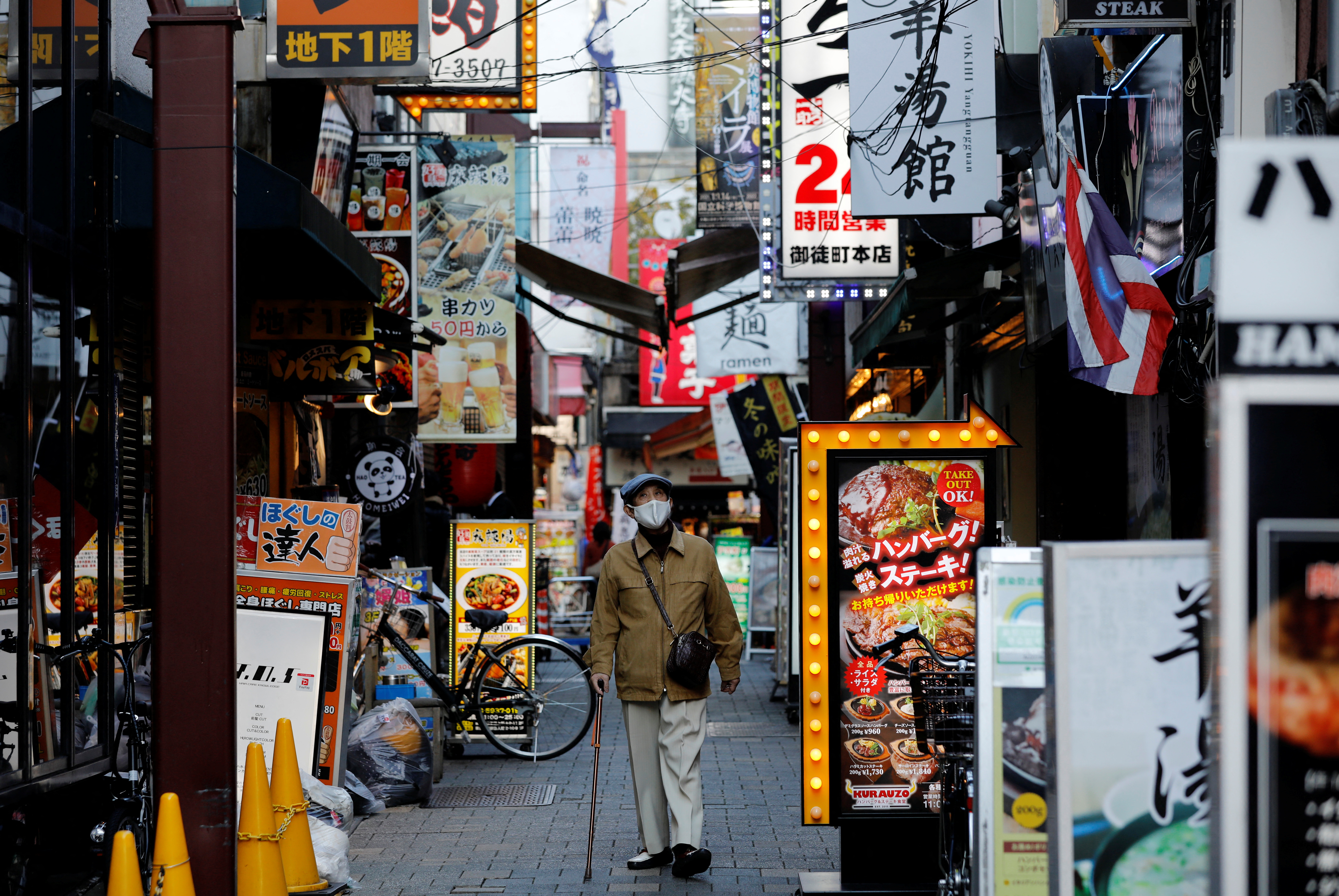
A man wearing a protective mask, amid the coronavirus disease (COVID-19) outbreak, makes his way at a restaurant district in Tokyo, Japan, December 1, 2021. REUTERS/Kim Kyung-Hoon
Japan's government is not considering an immediate change to current COVID-19 restrictions, Chief Cabinet Secretary Hirokazu Matsuno said on Thursday, a day after community transmission of the Omicron variant was discovered in the country.
The government confirmed on Wednesday that a family of three based in the western city of Osaka were infected by the Omicron variant and the origin of how they had caught the virus could not be traced.
The government has started preparations to expand free testing to people who don't have COVID-19 symptoms in an attempt to prevent the spread of the Omicron variant, news agency Jiji reported on Thursday citing unnamed government sources.
Retrieved from: https://www.reuters.com/world/asia-pacific/no-change-japan-covid-19-restrictions-despite-omicron-transmission-2021-12-23/
By Cora Engelbrecht and Megan Specia
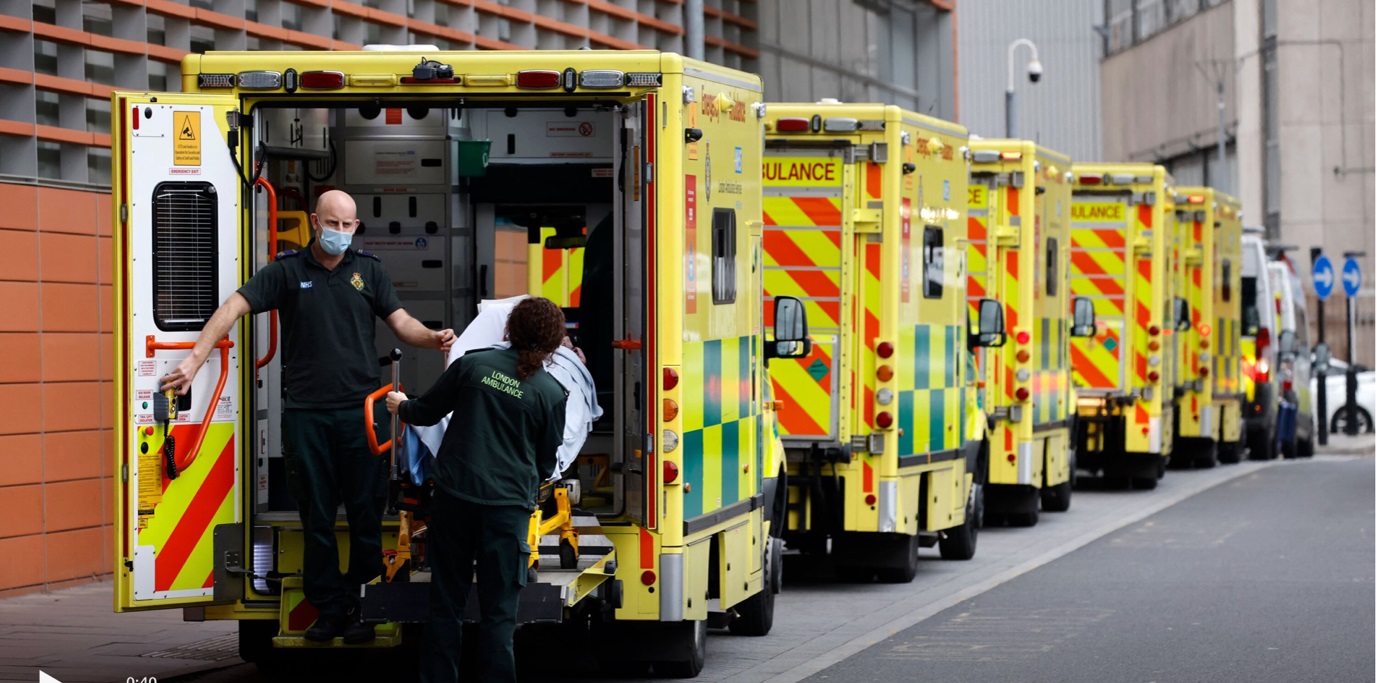
Health officials reduced the number of days people must isolate after showing Covid-19 symptoms to seven from 10, if they test negative on the sixth and seventh days. The move comes as a surge in the Omicron variant drives up cases.CreditCredit...Tolga Akmen/Agence France-Presse — Getty Images
LONDON — Britain surpassed 100,000 new coronavirus cases on Wednesday for the first time since the start of the pandemic, as England’s government announced an easing of isolation restrictions.
The new toll of 106,122 new infections — the highest ever — comes as the highly transmissible Omicron variant continues to surge across the country. The uptick is a 50 percent increase over the past week, according to government data.
A surge in coronavirus cases has winnowed the staffs of hospitals, clinics, rail services, fire departments and ambulance services across England, where most pandemic restrictions have been lifted since the summer. Before the new case numbers were released on Wednesday, England’s announced that it was reducing the number of days that people are required to isolate for after showing Covid-19 symptoms to seven days from 10 days — a change that officials said was based on updated guidance from health experts, and that could help alleviate the staffing shortages.
Sajid Javid, the health secretary, said the move was based on guidance from the government’s Health Security Agencys that a weeklong isolation period along with two negative test results had “nearly the same protective effect as a 10-day isolation period.”
Prime Minister Boris Johnson has resisted adding new restrictions before Christmas, although he has said that he “would not hesitate to act” after the holiday if needed.
People in England will be allowed to end their quarantines if they can produce negative tests on days six and seven. That creates a more lenient policy than in the United States, where people can end their isolation periods 10 days after showing symptoms if they have not had a fever for 24 hours and if their other Covid-19 symptoms are improving.
“This new guidance will help break chains of transmission and minimize the impact on lives and livelihoods,” Dr. Jenny Harries, the chief executive of the government’s Health Security Agency, said in a statement. She emphasized that people must continue to follow public health advice.
People who are not fully vaccinated are still required to isolate for 10 days if they come into contact with an infected person.
Elsewhere in Europe, governments have been divided in their responses to widening outbreaks of the Omicron variant.
The Netherlands has closed nonessential shops, bars, restaurants, gyms, outdoor sports, cultural venues and schools. Sweden said this week that it was adding new restrictions on gatherings, and Finland is instructing restaurants to close early starting on Friday.
Other countries have held off introducing further restrictions before Christmas. New rules in Germany will come into effect on Tuesday, and in Portugal, nightclubs and bars will close from midnight on Saturday for at least two weeks.
In France, proof of vaccination is required for entry into bars and restaurants. The government has said it does not plan to add further restrictions. Health Minister Olivier Véran said on Wednesday that the focus was on the speedy rollout of booster shots.
In Britain, Scotland and Wales are adding restrictions starting on Sunday. Prime Minister Boris Johnson has not ruled out further restrictions in England, where a wave of infections is putting severe pressure on the National Health Service, which was already under strain from worker shortages caused by funding cuts, Brexit and the exhaustion from nearly two years of facing the pandemic.
Britain is not experiencing the kind of dire shortage of beds that hospitals faced during earlier peaks of the pandemic, but the pressure on the system caused by staff illnesses is evident across the country.
Data projections from the Health Service Journal, a trade publication, indicated that one in three workers in the National Health Service could be absent from work by New Year’s Eve if the current case rate continues.
Although some evidence suggests that the Omicron variant may produce less severe symptoms than Delta, it also appears to be up to twice as transmissible.
The Victorian government has taken a swipe at Scott Morrison and Dominic Perrottet for failing to act on health advice recommending the introduction of mask mandates.
Victoria’s acting premier, James Merlino, has announced that from 11.59pm Thursday masks will become mandatory in all indoor venues outside the home, for those eight years and over across the state.
Mask mandates are now in place in Victoria, Queensland, the ACT, Tasmania, parts of the Northern Territory and certain high-risk settings in South Australia.
Merlino also said face masks would be required at all major events with more than 30,000 patrons.
“This is a sensible response which will allow businesses to stay open, bars and restaurants to continue to stay open and major events to go ahead,” Merlino said.
“Masks are a cheap and effective way to maintain the health of the community – it’s something public health experts have been calling for.”
Victoria’s chief health officer, Brett Sutton, said he had acted in accordance with the advice received by the federal government from the Australian Health Protection Principal Committee (AHPPC).
“Masks will help keep businesses open and they massively reduce the risk of transmission,” Sutton said.
“The modelling that the commonwealth received from AHPPC tells us that the risks of not acting far outweigh the risks of acting. So the modelling also tells us that people wearing masks will significantly reduce the pressure on our hospitals and keep people safe.”
The prime minister has stopped short of calling for a national mask mandate over the Christmas period, despite health advice to make them compulsory indoors.
The NSW premier has also resisted calls to introduce indoor mask mandates.
Medical bodies, including the Australian Medical Association and Professional Pharmacists Australia, had urged national cabinet to reinstate some public health measures, including masks indoors.
Merlino said further lockdowns were not on the table because Victoria was in a strong position due to its high rates of vaccination.
The government will pour an extra $31m into helping the commonwealth booster program while awaiting advice on reducing the third dose interval from the expert immunisation panel.
Wednesday’s national cabinet meeting heard advice from federal health officials that “highly recommended” wearing masks indoors and other places where social distancing was difficult.
But the nation’s chief medical officer, Paul Kelly, said it was up to states and territories as to whether they would achieve that through mandates.
Morrison said mask-wearing was a personal choice.
“Wear a mask in an indoor setting. You don’t need to be forced to do it,” he said. “There’s no confusion about it, just wear one.
“Think of Christmas Day when you’re going to see elderly relatives and wear a mask – it’s pretty simple.”
Victoria recorded 2,005 new Covid cases and 10 deaths on Thursday, the first time the state’s daily count has been above 2,000 since late October.
There was a jump in case numbers across the eastern states, with NSW recording 5,715.
Queensland’s daily Covid numbers also jumped substantially with 369 new infections recorded, up from 186 the previous day.
The jump in numbers came as Queensland’s premier, Annastacia Palaszczuk, flagged changes to the state’s regime for travellers arriving from interstate hotspots, but not in time for Christmas.
Currently, those wanting to come to Queensland must get a negative PCR test result in the 72 hours before arriving, but waiting times at testing clinics around the country are very long.
“We had a great national cabinet meeting yesterday, we’re talking about those rapid tests … we’re looking at bringing those in on the first of January,” Palaszczuk said on the Gold Coast on Thursday.
NSW premier Dominic Perrottet
Arrivals from NSW, Victoria and the ACT are increasing by “about 30,000” a day”, she said.
The federal health minister, Greg Hunt, said it was a matter for states and territories to introduce mask mandates.
“We’re encouraging people, as a result of the advice to national cabinet, to use masks in indoor settings,” he said.
“It’s a matter for states and territories. But states and territories with their public health orders, whether it’s the QR codes in New South Wales, the masks in Victoria, have responded well. And I think it’s important for me to acknowledge that.
“And where national cabinet has led to a positive approach with regards to what are called public health and social measures, or basically the way in which people interact with each other, so they’re safer, but they’re still able to get on with their lives, I think that’s a very important show that national cabinet is delivering safer outcomes, but without constraining people’s lives.”
Meanwhile, residents of Perth and the Peel region in WA will be required to wear face masks at indoor venues during the Christmas period after an unvaccinated French backpacker who attended more than a dozen venues tested positive to Covid.
The mask requirement will apply to all public indoor venues, including shopping centres and on public transport, from 6pm on Thursday until at least 6am on 28 December.
It will not apply to home settings including family Christmas Day gatherings or during vigorous outdoor exercise.
High-risk large public events including music festivals will be cancelled and all nightclubs closed, with dancing banned except for during weddings.
But the premier, Mark McGowan, said the state’s high level of vaccination meant Perth and Peel would not go into lockdown as occurred during previous outbreaks.
Retrieved from: https://www.theguardian.com/australia-news/2021/dec/23/victoria-reintroduces-mask-mandates-as-acting-premier-takes-swipe-at-scott-morrison
If you’ve just joined or you’re waking up over in the UK here is a quick snapshot of the how Covid is unfolding across the world:
· Omicron carries lower hospitalisation risk and does not cause more severe illness than previous variants, studies from the UK and South Africa suggest.
· China locks down 13 million people in Xi’an after detecting 127 Covid cases. All residents are barred from leaving their houses except to buy living necessities every other day or for emergencies.
· Australian states reimpose mask mandates with NSW and Victoria set to join Queensland, the ACT, Tasmania and parts of the Northern Territory in requiring masks for inside areas.
· Organisers of the Beijing Winter Olympics said they expect a “certain number” of Covid-19 cases in China due to foreigners arriving for the Games.
· South Korea set a new record for Covid deaths on Thursday.
· Emergency Covid testing sites are being set up in hard-hit areas across the US.
· Americans vaccinated and boosted who choose to attend large gatherings over the holidays may not be safe, even for those who received a booster dose, top US infectious disease expert Dr Anthony Fauci said.
· In Quebec, Canada, gatherings inside homes will be limited to six people or two family bubbles beginning the day after Christmas.
Retrieved from: https://www.theguardian.com/world/live/2021/dec/23/covid-news-live-omicron-carries-lower-hospitalisation-risk-studies-suggest-china-locks-down-city-of-13-million